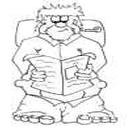Question #52756. Asked by chris42.
Last updated Sep 19 2016.




Uncorroborated theories have been advanced to explain the meaning of the rhyme. These include that it is a complaint against Medieval English taxes on wool and that it is about the slave trade.


The great English landowners including lords, abbots and bishops began to count their wealth in terms of sheep, with some flocks totalling over 8,000 animals, all tended by dozens of full-time shepherds.
After returning from the crusades in 1272, Edward I imposed new taxes on the wool trade in order to pay for his military ventures. It is believed that this wool tax forms the background to the rhyme. One-third of the price of each bag, or sack sold, was for the king (the master); one-third to the monasteries, or church (the dame); and none to the poor shepherd (the little boy who cries down the lane) who had tirelessly tended and protected the flock.
|
|
|
|